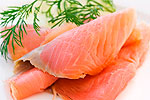 Everyone who pays attention to health news knows that omega-3 fats in fish are extraordinarily healthful. In my ongoing series on blood pressure, we find that omega-3s could help those who suffer hypertension.
Everyone who pays attention to health news knows that omega-3 fats in fish are extraordinarily healthful. In my ongoing series on blood pressure, we find that omega-3s could help those who suffer hypertension.
The inverse relationship between fish intake (specifically omega-3 fatty acids) and heart disease was well established after we discovered that inhabitants of Greenland had a low death rate from heart disease despite a fat-rich diet. Later on, it was shown by large population studies that there is also an inverse relationship between omega-3 fatty acids and the incidence of stroke. This observation helps to fuel intensive research into the effect of omega-3 fatty acids and their effect on blood pressure.
A meta-analysis found that omega-3s’ effect on blood pressure is dependant on dose. The minimal dose to be effective is three grams a day. The blood-pressure-lowering effects in untreated high blood pressure were 5.5 mmHg (systolic blood pressure) and 3.5 mmHg (diastolic blood pressure).
In a meta-analysis of 31 studies with 1,356 individuals, omega-3 fatty acids lowered blood pressure again. Each gram of omega-3 led to a 0.66-mmHg and 0.35-mmHg drop in systolic and diastolic levels, respectively. Whereas normal people had no significant effects from omega-3, those with high blood pressure experienced drops of 3.4 mmHg and 2.0 mmHg in systolic and diastolic levels.
In a meta-analysis of 36 studies with an average of 3.7 grams a day of omega-3 fatty acids, systolic blood pressure dropped by 2.1 mmHg and diastolic by 1.6 mmHg. The blood-pressure-lowering effects of omega-3s were more significant in adults over 45 years and those with high blood pressure.
Now, there are two major omega-3 fats in fish — eicosapentaenoic acid (EPA); and docosahexaenoic acid (DHA) — that have different effects on blood pressure.
In one good study, 59 overweight patients were randomly assigned to get four grams a day of purified EPA, DHA, or olive oil (placebo) capsules for six weeks. Only DHA — not EPA — lowered blood pressure. Compared to the placebo, DHA lower systolic blood pressure by 5.8 mmHg and diastolic blood pressure by 3.3 mmHg, and lowered heart rate.
In another study of 265 adults (between 30 and 54 years old), the effect of modest variations of omega-3 fatty acid intake on blood pressure was studied. The results: DHA again was the effective treatment, lowering diastolic levels by 2.1 mmHg.
Here are the previous parts of this blood pressure series:
What You Need to Understand About Blood Pressure
The Doctors’ Solution for Hypertension
DASH to Lower Your Blood Pressure
Four Minerals to Combat High Blood Pressure
The Protein to Lower Blood Pressure
Two Red Foods That Will Drop Blood Pressure
Can This Sweet Treat Drop Your Blood Pressure?
This Drink Has Interesting Effects on Blood Pressure
